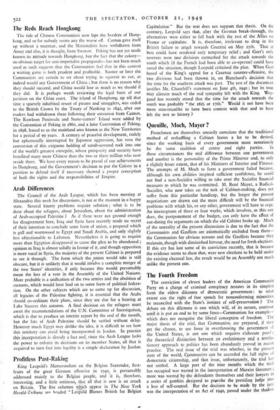The Reds Reach Hongkong
The tide of Chinese Communism now laps the borders of Hong- kong, and so far nobody seems any the worse off. Canton gave itself up without a murmur, and the Nationalists have withdrawn from Amoy and also, it is thought, from Swatow. Peking has not yet made known its attitude towards Hongkong, but the fact that the colony— an obvious target for anti-imperialist propaganda—has not been much used as such suggests that the Communists feel that in this context a waiting game is both prudent and profitable. Sooner or later the Communists arc certain to set about trying to squeeze us out, as indeed would any Government of China ; but there is no reason why they should succeed, and China would lose as much as we should if they did. It is perhaps worth reviewing the legal basis of our position on the China coast. The island of Hongkong, up till that time a sparsely inhabited resort of pirates and smugglers, was ceded to the British Crown by the Treaty of Nanking in 1842, after our traders had withdrawn there following their extrusion from Canton. The Kowloon Peninsula and Stone-cutters' Island were added by the Convention of Peking in a6o, and a later Convention of Peking, in i898, leased to us the mainland area known as the New Territories for a period of 99 years. A century of peaceful development, rudely but ephemerally interrupted by Japanese aggression, has seen the conversion of this exiguous holding of scrub-covered rock into one of the world's greatest en:remits, whose prosperity and security have benefited many more Chinese than the two or three million who now reside there. We have every reason to be proud of our achievements in Hongkong, and the Government's decision to put the Colony in a position to defend itself if necessary showed a proper conception of both the rights and the responsibilities of Empire.


































 Previous page
Previous page